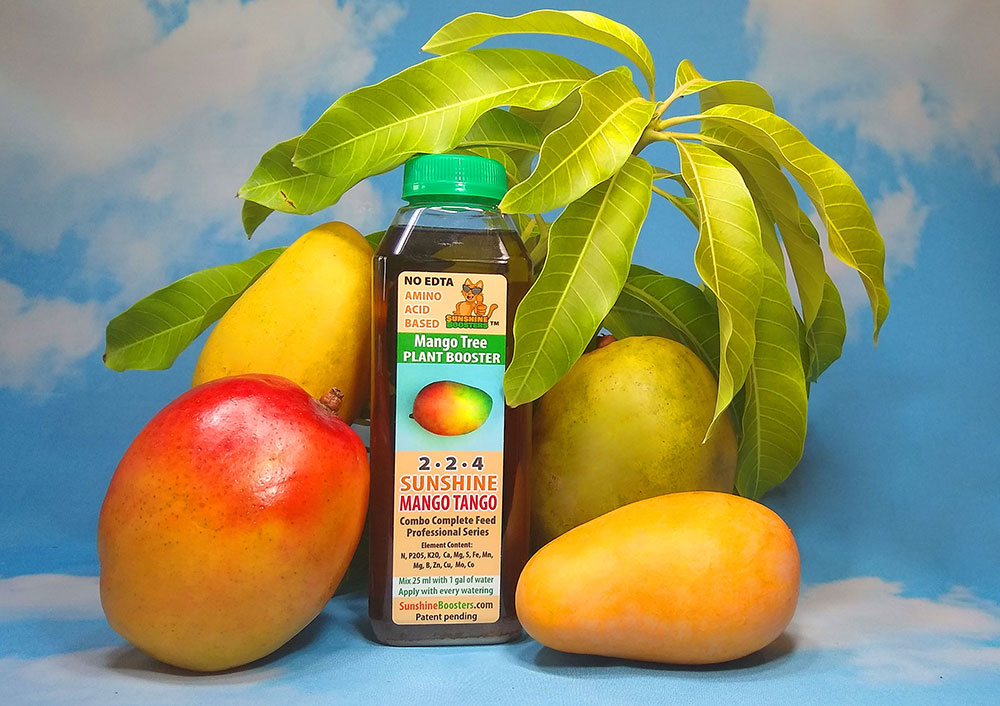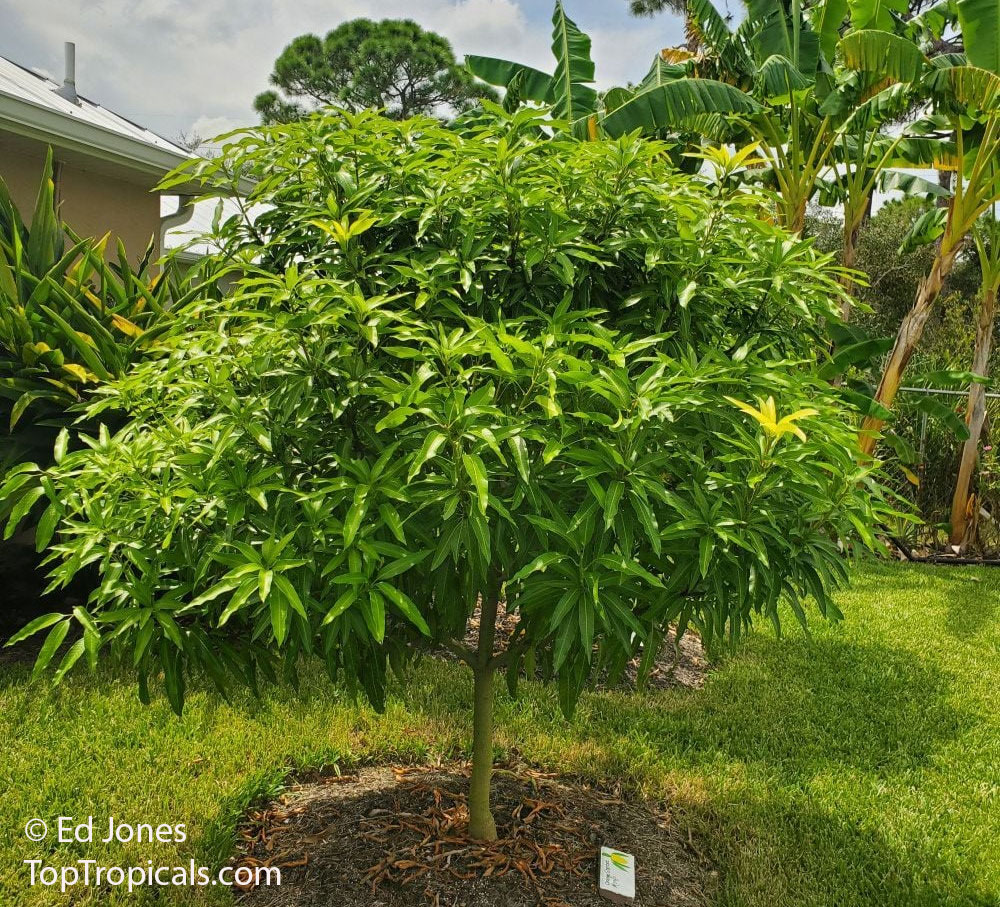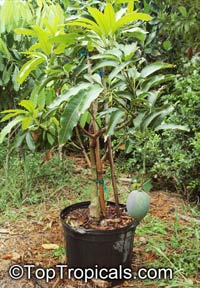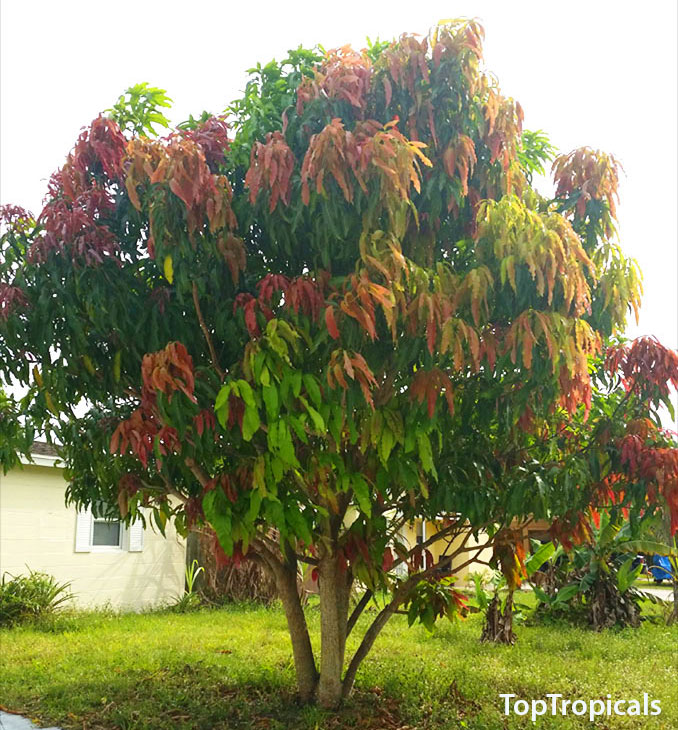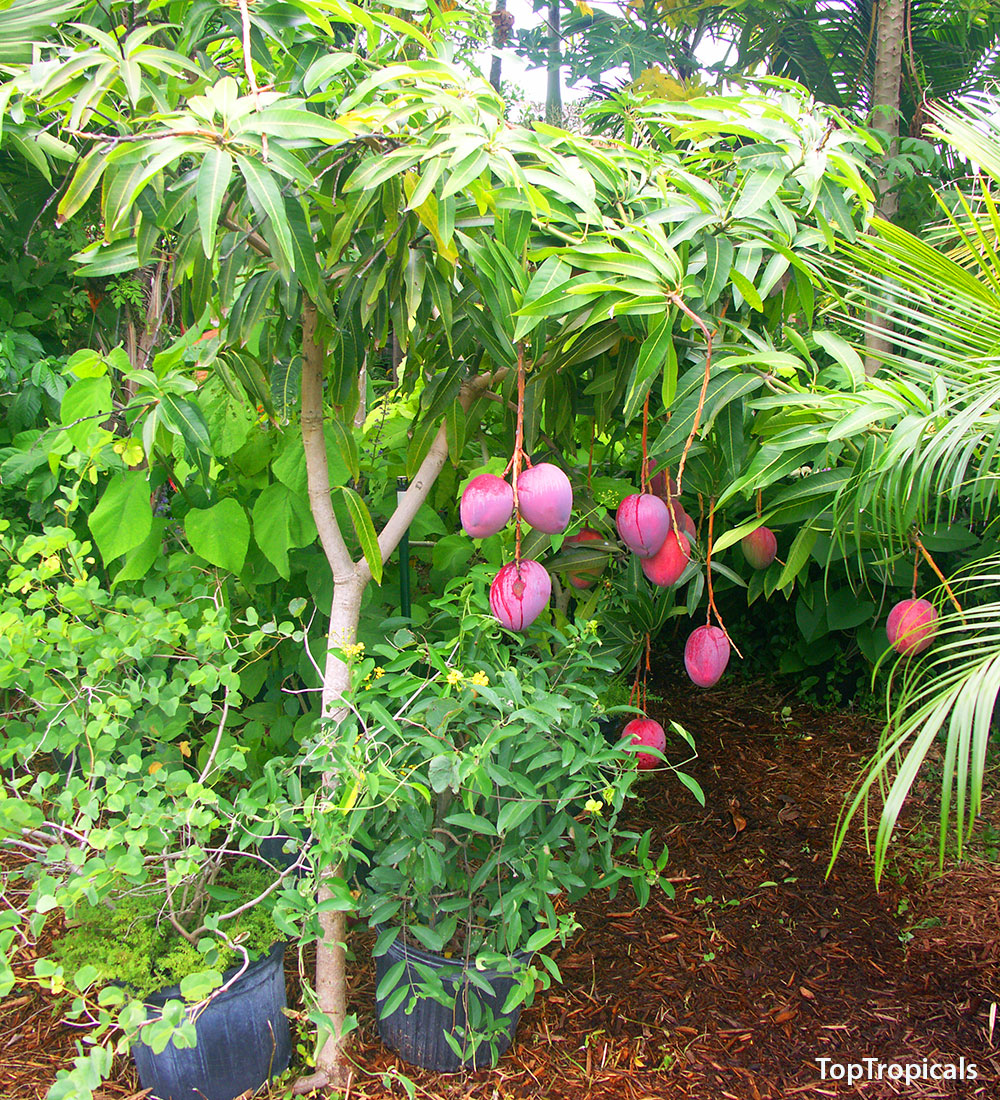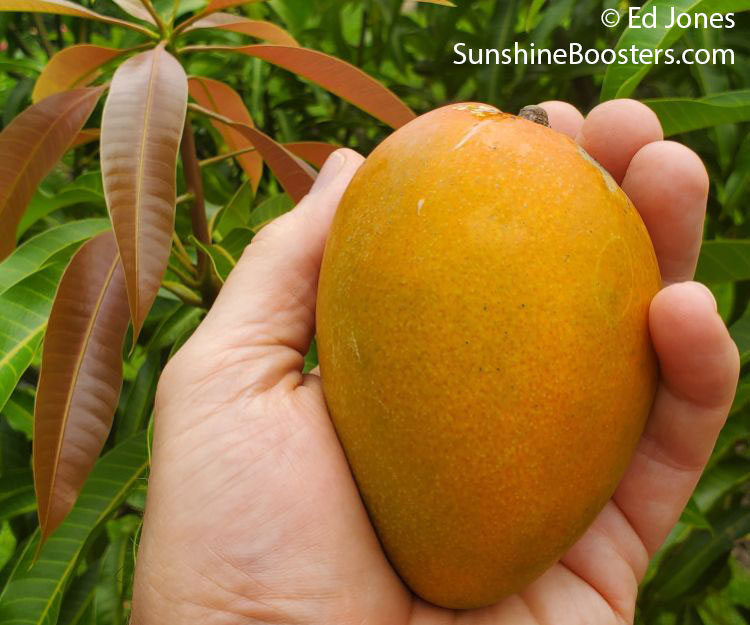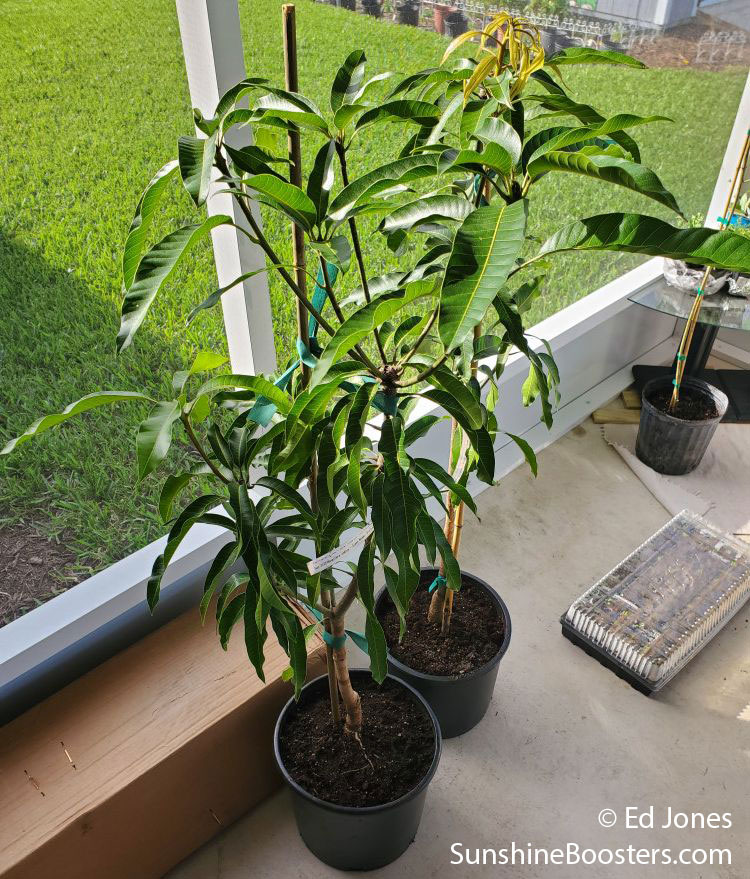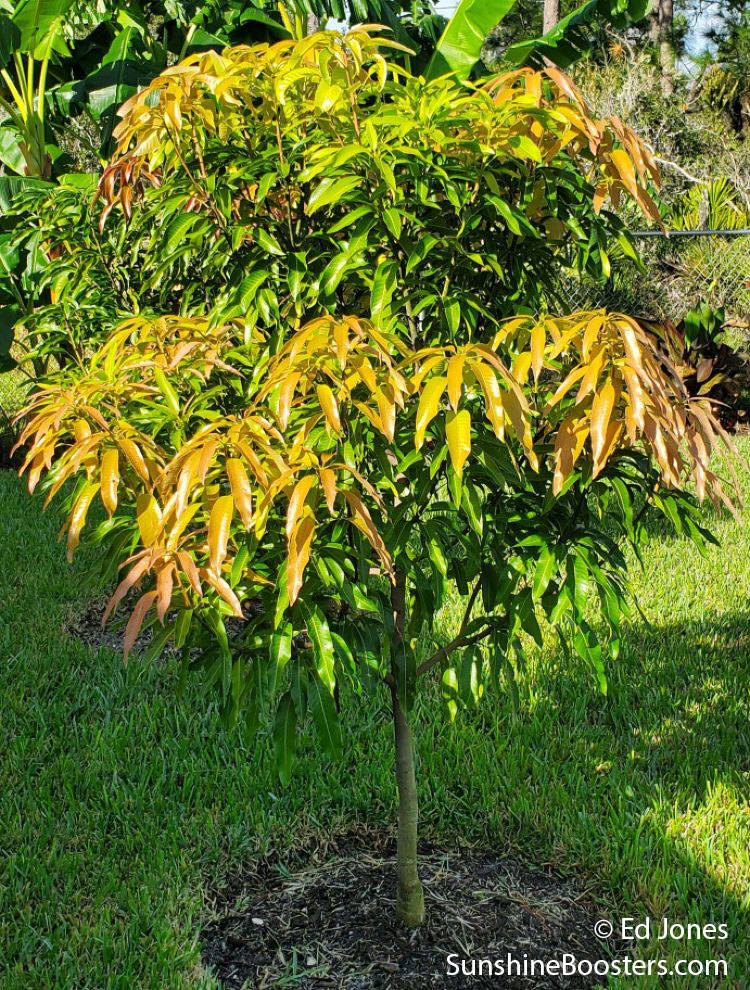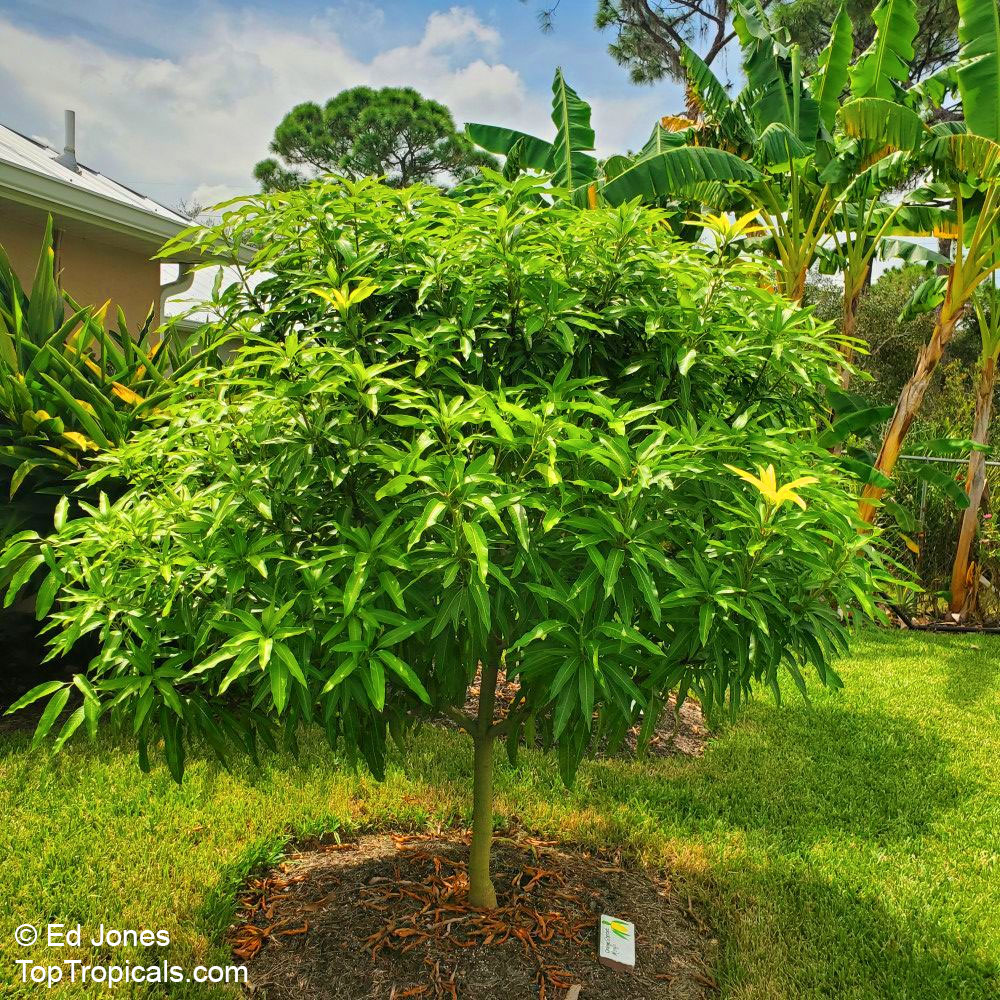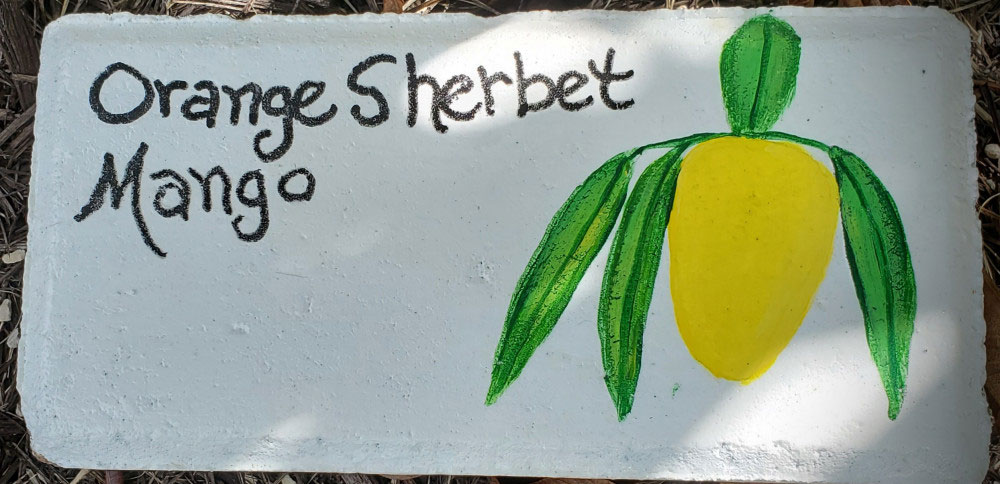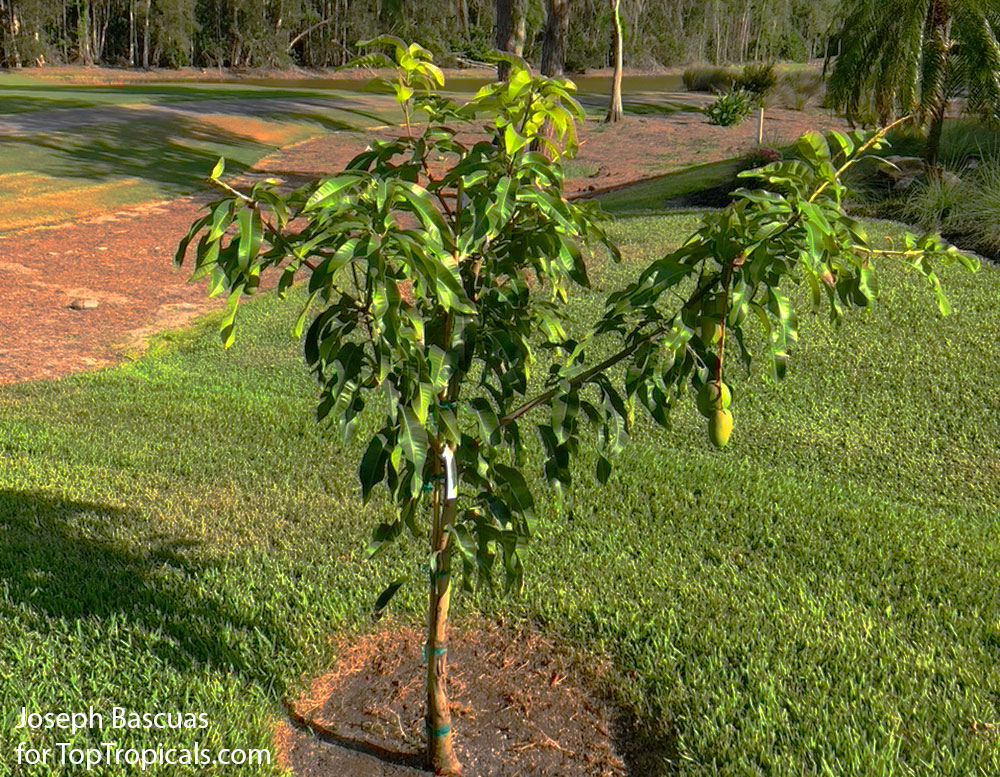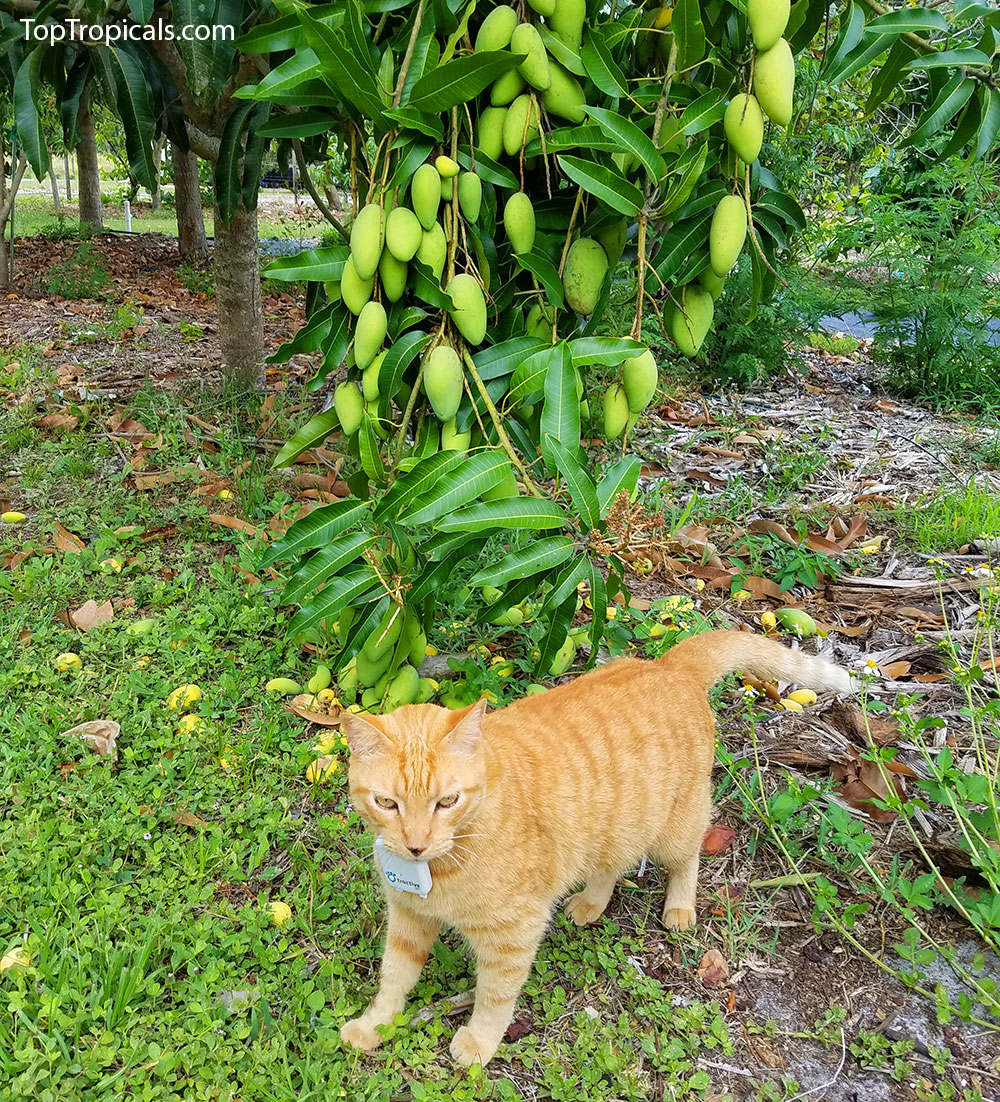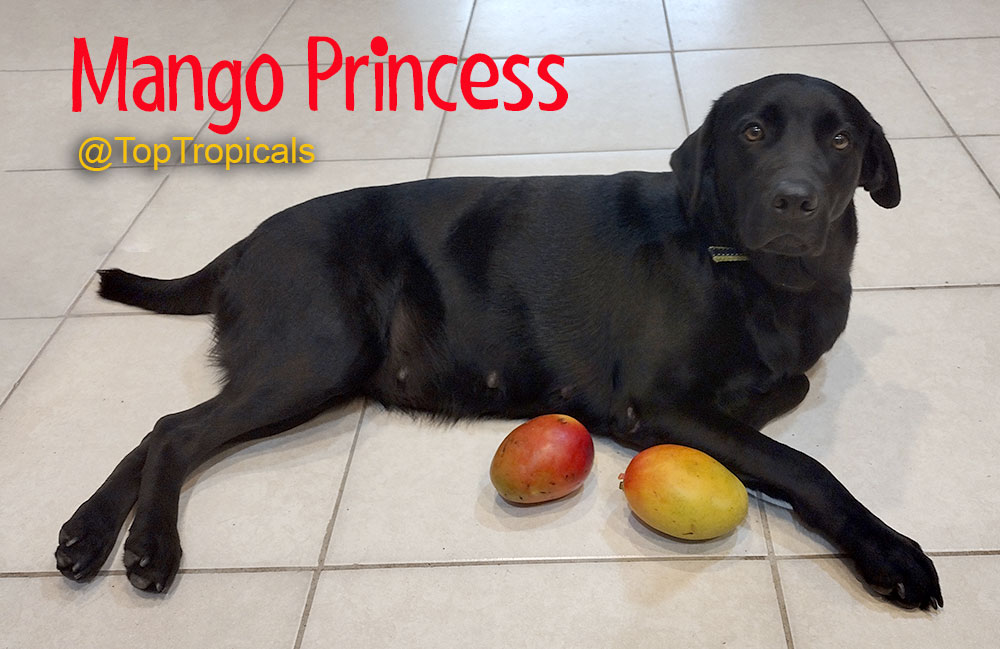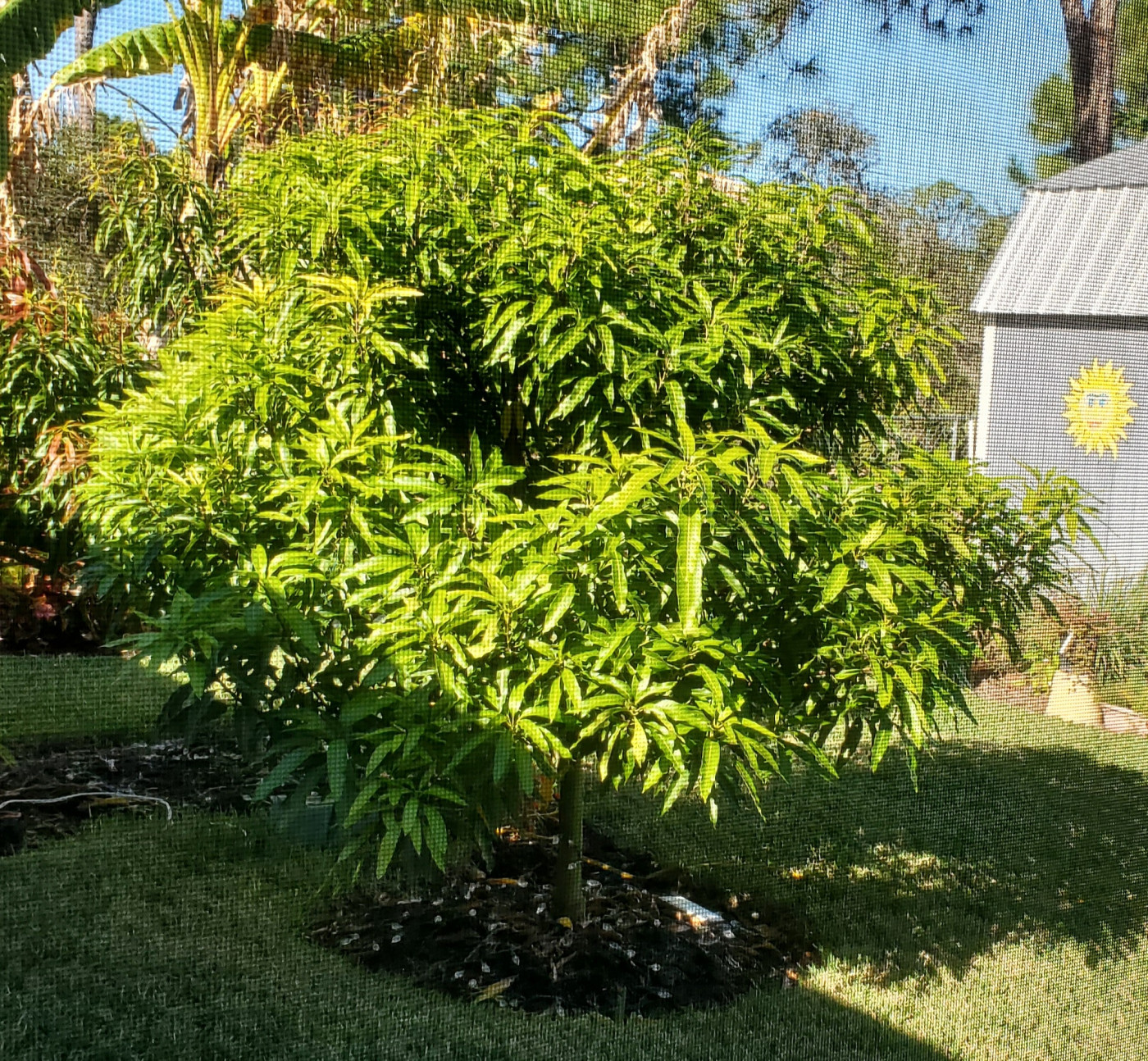Garden Blog - Top Tropicals
Date:
10 secrets of growing a perfect Mango tree
Grow Your Own Food
How to grow a healthy and productive mango tree?
1. Right variety. Select a vigorous grower for
in-ground planting, or a condo mango cultivar for growing in container. More info on varieties.
2. Soil must be well-drained. If planted in the ground, plant on a
little elevation (see How to plant a tree)
3. Full sun is a must. The more sun, the more flower and fruit.
4. Water. Keep mango tree on a dry side, water young trees regularly
but let top of the soil dry before next watering. Mango trees don't like wet
feet.
5. Air circulation is important for mango tree to eliminate
diseases. Allow enough space from other trees and buildings.
6. Fungicide. Mango leaves are very susceptible do fungal issues,
especially in humid climates likу Florida. Spray fungicide (Copper or similar)
according to the label, once a month.
7. Fertilize year around with every watering with liquid fertilizer
Sunshine
Boosters Mango Tango. Apply Micro-elements once a month and use other good supplements.
8. Shape. Check out Video:
">Tipping your mango tree - to shape the most vigorous and productive
tree.
9. Protect from hard freeze. Mango tree doesn't take freezing
temperatures well. In subtropical areas Mango can be protected. Alternatively, it can successfully produce in
container, if moved indoors during cold weather.
10. Fruit. Mango tree produces thousands of little flowers, many of
them can set fruit. Do not let a small, young tree to keep more than 1-2
fruit, remove extra, to avoid exhaustion. Allow 2-3 years for the tree to
establish until it produces a full crop. Apply Sunshine Honey supplement to your tree for sweeter fruit.
Date:
Condo Mango
Q: I was curious about indoor fruiting mango trees. I live in upstate New York and was thinking about trying to grow an indoor tree for fruit. I have a small heated greenhouse. Is there a variety that can be grown from seed that would suit my purposes and if not what is the most economical way I could obtain a cutting or small grafted plant? I keep my greenhouse around 60F in the winter and have no supplemental lighting. Are there any varieties that may work in a sunroom or other well lit indoor location?
A:
There are many dwarf varieties of mango suitable for container culture. They
are called "condo mangoes".
The most popular condo varieties are: Carrie, Cogshall, Cushman, Fairchild,
Graham, Ice Cream, Julie
, Mallika, Nam Doc Mai,
Pickering. You may read more about them in our online
catalog. You may also look into variety
Lancetilla which is also a compact tree, and produces one of the biggest size
fruit, up to 5 pounds. If you want some rare variety that hardly anyone else has -
try Baptiste, an exotic Haitian dessert
mango.
Your greenhouse should work for the winter time. Mango trees can take
as low as mid 40s during winter and even lower as long as that cold is
occasional. If you keep the temperature around 60, this should work well for over
wintering. Just make sure to reduce watering to a minimum, because cool
temperatures, low light and wet soil - is a bad combination for tropical plants,
especially for mango trees which prefer to be kept on a dry side.
Many indoor gardeners have fruiting mango trees in their collection. However,
keep in mind that the most important requirement for a mango is full sun.
While you may over winter the plant for a few months in a low light conditions,
in order for it to flower and produce fruit it needs lots of light. If moving
the tree into full sun your yard during the summer is possible, this would
be the best solution.
We always recommend
SUNSHINE boosters for both over wintering tropical plants in colder
climates, and for indoor gardening. SUNSHINE applications will help your tree to
cope with cool temperatures and low light conditions. This will also
dramatically increase flowering and fruiting performance. Another important factor for
keeping your container plant healthy is quality of your potting soil. We
offer a special
professional mix that contains lots of good stuff: coconut fiber, peat moss, pine
bark, and perlite. Fertilizing potted plants
is also very important during the warm season, because this is the only way
for them to get nutrients (which in the ground can be reached by spreading
root system).
As far as seedlings vs. grafting - the only way to
have a nicely fruiting mango tree is to plant a grafted variety. Seedlings start
producing only after 8-15 years, and the quality of such fruit may be
questionable. Only grafted plants can guarantee the desired taste of a variety.
Besides, grafted mangoes start producing immediately - you may see fruit forming
on plants as small as 3 ft, in 3 gal containers. However, during the first
1-2 years you will need to remove extra fruit and leave only 1-2 fruit so the
plant doesn't get exhausted and has enough energy to establish strong root
system.
For fun stories about growing mango, check out our Radio
Show recording YO Tango Mango!
Date:
How to feed a Mango tree...
and to grow a Dwarf Mango
How to fertilize a Mango tree
Q: My mango trees that I bought and planted last august now have fruit. I bought 2 types of fertilizer from you and never used it. Should I use your fertilizer now?
A: It is a perfect time now to fertilize your plants as they
start active growth.
For mango trees, we recommend liquid fertilizer Sunshine Booster - Mango Tango. It is formulated for Mango trees,
especially for container grown. It improves quantity and quality of flowers and
ability to set fruit, reduces bud-flower-fruit drop. Can be used as often as
with every watering. For best results, use in combination with Sunshine Honey and Sunshine Superfood plant supplements. Its scientifically-balanced
stable formula is organic Amino-acid based and has NO EDTA chelators to eliminate
nutrients lockup; it does not affect crop taste.
Additionally, you may use slow-release granulated fertilizer Mango-Food once a month during hot season only. Dosage: 1 teaspoon per
each gal of soil.
Water-soluble fertilizers can be also used, however, those are usually
EDTA-chelated which is not as efficient as Amono-acid based Sunshine Boosters and
may create nutrients build up, especially if overdosed in containers.
For in-ground mango trees, you may use all the above, and slow-release
granulated fertilizer can be applied in larger quantities: spread a handful
around the drip line.
Remember that only liquid Sunshine Boosters can be applied year around. With other fertilizers, you need to be careful not to overdose, and apply only during hot weather (when night temperatures are steadily above 65F).
How to grow a Dwarf Mango tree
Q: I received the Ice cream mango tree in great condition (thank you for the ingenious packing job) on Wednesday and have planted it in a pot slightly bigger than the root ball. I plan to grow the tree on my front porch, so how big a container should I ultimately use when the tree outgrows this pot? How big a container does it need to fruit? I hope to keep it around 6-7 feet high, if possible. I live in Hawaii.
A: Ice Cream mango is a perfect variety for container culture, and it should be happy in Hawaii. You did everything right. Keep it in this small pot for now and wait until it starts vigorous growth in Summer. Once it starts growing (and you will notice roots growing too, sometimes they try to grow through the holes in the bottom of the pot), then it's time to step up into a bigger container (7-10 gal). Eventually you may use container size as large as 15 gal. Ice cream mango is slow growing and compact, and you will be able to maintain it under 7 ft with very minimal pruning if any.
Date:
Healthy Plants: Q&A from Mr Booster - Mango Talk
Today we are introducing a new column - Mango Talk! Everybody loves Mango
- the most delicious fruit in the world. Fruit experts like to talk about
varieties, how to grow a Mango tree better, and the fruit bigger and sweeter.
And beginners want to know more! What variety to get? How to take care of it?
How to get more fruit sooner than later?
This easy-read blog from Ed Jones is about the first steps - what to do
when you get your first Mango tree...
In our future publications, you will hear from Mango experts and have a
tour on Mango varieties...
Fertilize your Mango trees
By Ed Jones, the Booster Guy
Ok, you finally did it. You bought your first mango tree. Now what? Well, you have to love it and feed it and trim it and love it some more. But today, lets talk about how to fertilize your mango tree. The photo above shows some very small grafted mango trees. This is probably how yours will look when you bring them home or have them delivered....
CONTINUE READING >>
The photo above is of the two trees at the beginning of this blog after just under 10 months of TLC.
Date:
After Super Bowl Sale

Chill out and relax by planting a tree! We just watched the most exciting Super Bowl ever... What a game! It was the greatest comeback in Super Bowl in history. Now it is time to let Top Tropicals help give your garden a great comeback too. Relax, have some peaceful happy time, and nothing can be better than planting a tree!
The best tree ever, by many features is a Mango tree. Here at least 5 reasons why:
1. Mango tree is good for beginners since it has low maintenance requirements, including low water needs.
2. Mango tree is easy to ship.
3. Mango tree is a great present.
4. Mango tree is a rewarding fruit tree that will produce fruit for you the same or next year - all our varieties are grafted and ready to bloom.
5. Mango tree produces the most delicious fruit in the world. The sweetest, flavorful, fiberless varieties can be only tasted from home gardens - they simply are not available from grocery stores due to transportation reasons (only fiborous low quality fruit can be safely shipped and stored).
Take advantage of this generous 25% off offer and get yourself a mango tree:
- Dwarf varieties, "Condo" mangoes, great for containers: Carrie, Cogshall, Ice Cream, Julie, Lancetilla, Lemon Meringue, Mallika, Nam Doc Mai, Pickering.
- Large, fast growing, vigorous trees that will quickly create shade and comfort in your garden: Bailey's Marvel, East Indian, Haden, Jakarta, Philippine, Southern Blush, Valencia Pride.
- Exotic collectibles that are hard to find and almost nobody has, be a proud owner of delicious exotic flavors: Alampur Baneshan, Alphonso, Choc Anon (Miracle), Heidi, Maha Chinook, Pim Seng Mun.
Happy planting, end enjoy your fruit soon! See all varieties (for backorder items, add to your wishlist and you will be notified when available, very soon!)
Hurry up, WHILE THE STOCK LASTS! Offer is valid 2 days only, and expires February 9. Offer not valid for previous purchases.
Date:
Mango Talk: How to prune mango trees for best shape and production
by Ed Jones, the Booster Guy
...Why should you prune your mango trees? There are a few reasons.
First, a good foundation is the key to strong growth and a shapely tree.
Second, if you get your mango tree started off on the right foot with a
strong foundation, it becomes much easier to keep it shaped nicely.
And third - it will be forced to produce more branches allowing for more
places for fruit production...
...We received our Mango tree in late February of 2020 as a relatively
small plant in 3 gal pot...
...The opening photo was taken just last week and you can see that as she
grows, her shape is very nice...
...She is now about 7' tall and just as wide. She has a great foundation
and a lot of branches. We also have less grass to mow. She also got her very
own marker painted on a brick:
...We have also enlarged the circle of mulched area under the tree to allow it to be able to get nutrients from it's SUNSHINE Boosters Mango Tango without having to compete with the grass. This is one mistake that I see frequently in my neighborhood with all trees...
CONTINUE READING >>
Date:
Harvesting from a young mango tree
Q: About a year ago we bought a mango tree from you folks and planted it in our backyard in Estero. It has done well. It now has several mangoes and I am wondering if the tree is strong enough to support the fruit or if I should just cut off the fruit and wait until next year when the tree is a bit stronger. I am attaching some pictures. I am most concerned about the branch on the right which seems to be sagging. If you do not suggest that I cut off the fruit, can I wait until they ripen on the tree and eat them. They seem to be a bit on the small side for eating.
A: Your mango tree looks very healthy and happy, congratulation with a great job! For young mango trees, it is always recommended to minimize a number of fruit to 2-3 so
the tree has enough energy for vegetative growth rather than fruiting.
In your case, as we can see from the pictures, your tree is very well
established, has a strong root system, nice symmetrical shape, and vigorous new growth. In our opinion, you can save all
these fruit and let them ripen on the tree.
To support the plant's energy, make sure to fertilize it during summer with slow-release Mango Food, and year around - with Mango Tango booster. Use Sunshine Honey
supplement for sweeter fruit.
Secure the heavy fruit branch with a v-shape stake (a big branch may work), it can definitely use the support otherwise may break
under strong Florida winds.
You are all set to enjoy your first crop and be rewarded with fruit of your excellent work!
In the photo above: Mr B is harvesting Mango Pim Seng Mun after his successful Sunshine Boosters fertilizing program.
Date:
Mango: Fruit of Love and Friendship
In the photo: Mango Princess reincarnated. Mango is a Lab dog that got pregnant and lost her home... But she found her new life at Top Tropicals PeopleCats community. And she brought us a basket of happy puppies!
According to Hindu folklore, there was once a Sun Princess who was cruelly burned to death by a wicked sorceress... However, from the ashes of the princess, a mango tree sprung up, and the Emperor was immediately enchanted by the beauty of its blooms. The fruit that followed was equally as captivating and when the ripe mangoes fell from the tree, the Sun Princess was reincarnated.
Starting that moment on, the mango became a symbol of love and affection in India, and offering someone a basket of mangoes was seen as a gesture of friendship.
Today, mangoes are widely regarded as the most consumed fruit in the world, with approximately half of all tropical fruits produced globally being mangoes.
Date:
New Video:
Shaping your Mango Trees
by Ed Jones, the Mango Guy (and the Boosters Guy)
Learn how to shape your mango trees using a technique known as tipping. Tipping your mangos will help to develop more branches and will give the tree more places to flower and produce fruit.
See more by Ed Jones:
How to prune mango trees for best shape and production
...Why should you prune your mango trees? There are at least 3
reasons.
1. A good foundation is the key to strong growth and a shapely tree.
2. If you get your mango tree started off on the right foot with a strong
foundation, it becomes much easier to keep it shaped nicely.
3. It will be forced to produce more branches allowing for more places for
fruit production.
CONTINUE READING >>
Stay updated with TopTropicals Videos by subscribing to our channel at YouTube.com/TopTropicals and get our latest video news of what is fruiting and blooming!
See all available mango varieties from our store.
Date:
Top Story: The little mango tree that could
By Ed Jones, the Mango Guy
"...Until you dig a hole, you plant a tree, you water
it and make it survive, you haven't done a thing. You are just talking..."
- Wangari Maathai -
This is the story of the little mango tree that could. From the
beginning, it has been a fighter and has come through its latest battle with a few
scars, but it is still going...
...On January 30, the unthinkable happened. Cold weather was coming. We had
a low of under 25F on that Sunday morning...
...Then, on April 4, 2022 we had a very bad hail storm... Hail stones up to
3" fell for 20 minutes...
Learn more about what happened and see this mango tree today... What
helped it to survive and also what will help it to grow back into a beautiful
tree?
For information on how to shape your mango trees, see
Subscribe to our Channel:
Stay updated with TopTropicals Videos by subscribing to our channel at YouTube.com/TopTropicals and get our latest video news of what is fruiting and blooming!
